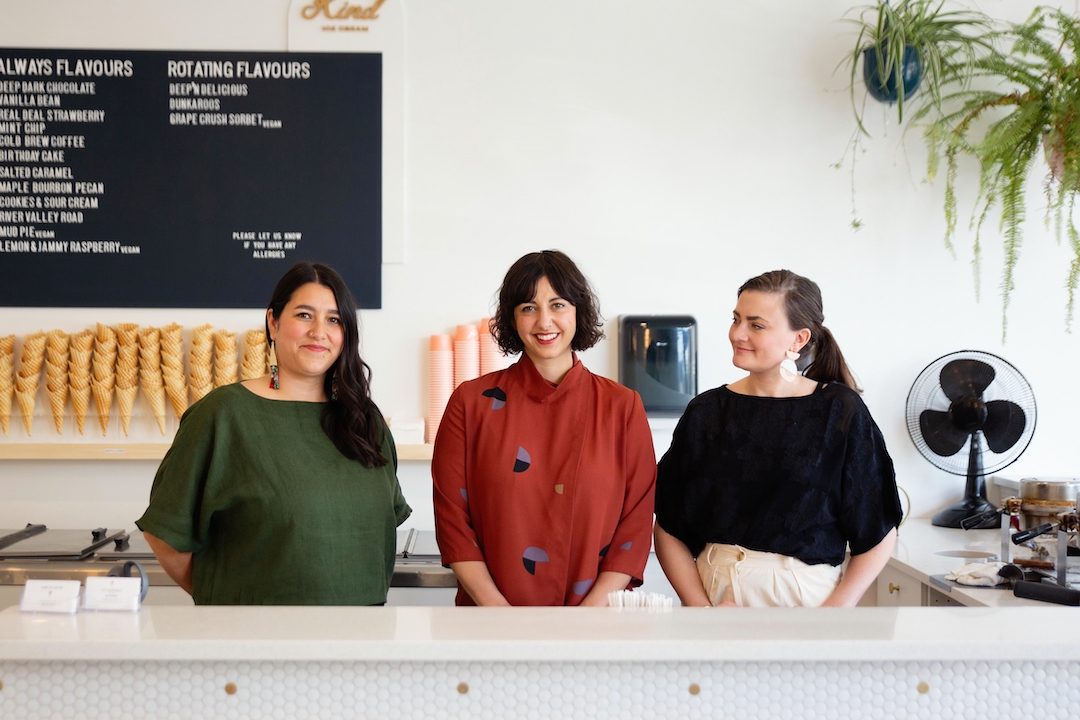Artisan creamery Kind Ice Cream is on a mission to expand its retail footprint, increase its production capacity, and embark on business-to-business sales using the $289,609 it received from the Edmonton Edge Fund.
The growth boils down to using two new mobile locations in converted shipping containers, expanding from 2,000 to 6,000 square feet of production space, and selling its ice cream base to other businesses. It's an ambitious plan, but not too ambitious.
"We're not interested in booming this business," co-founder Paula Shyba told Taproot. "We really love just being in the neighbourhoods we're in. We have pretty humble growth goals in that sense. We don't want to make billions or even millions. We just want to make thousands."
Shyba, along with co-founders Candyce Morris and Nicole Bhar, aims to do that by increasing production and distribution, though they have no plans to retail at major grocery chains, Morris told Taproot. Instead, they plan to secure a production kitchen that they estimate will cost $6,000 to $7,000 per month. They will also acquire a batch mix plant, a device for making ice cream base up to 600 litres at a time.
"The base equipment is definitely expensive, but … it's definitely a justified expense (for something) that we've been wanting for a while," Shyba said. "We're really fortunate because we pay fairly little right now for a kitchen that somehow manages to make ice cream for three shops."
The equipment should allow them to produce enough ice cream to sell in new custom, transportable units from HONOMOBO's line of food service structures called HONOMOBAR. The units cost about $80,000 each including refrigeration, water supply, and fixturing costs. The Kind team wants to launch them in 2025 and is considering the southwest and west end of the city for the inaugural locations.
The two mobile outposts "will be in a shipping container that we fully get to design and create with them," Shyba said. "Our hope is that we'll find great locations, and we will drop it off in May, and it will stay in that same location until, most likely, September."
New locations could reduce wait times for customers and boost revenue for the creamers at the same time. Kind currently operates in Ritchie, Highlands, and Wîhkwêntôwin, and the owners project $2.7 million in revenue for this year.
Another way the company may grow is through selling its ice cream base to other businesses, which is basically plain ice cream before it's flavoured with things like sponge toffee or peanut butter and Oreos. The owners are thinking of calling it Base Camp — pun presumably intended.

Kind Ice Cream owners (from left) Candyce Morris, Nicole Bhar, and Paula Shyba will use nearly $300,000 from the Edmonton Edge Fund to expand ice cream production, buy two mobile locations, and launch business-to-business sales. (Supplied)
The Edmonton Edge Fund's goal is to spur innovative projects that can generate economic good in the city. Kind received the smallest allotment from the Scale & Grow Stream, while the largest is $750,000 for mental health service provider DiveThru. Each Scale & Grow recipient must have matching funds, and Kind self-matched its funding.
Shyba said the process to secure Edge funding was straightforward and that her team felt "supported by the city." Morris credited her with doing "most of the heavy lifting" on the application process.
The through line between all of Kind's plans is to build resilience. Though Morris said Kind recently "had (its) busiest week of all time," the business had a "rough spring" due to not-so-hot weather. Increasing sales volume can mitigate lean times during winter and inclement weather.
"It blows us away when people are eating ice cream cones at our shop in the middle of January, but we operate at a loss for part of the winter," Shyba said. "Production, as well as the seasonality (of our business), are pretty big challenges for us."
